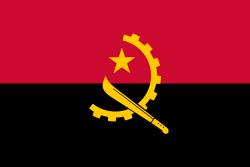 | |||
| Nickname(s) | Palancas Negras (Giant Sable Antelopes) | ||
|---|---|---|---|
| Association | Angolan Football Federation | ||
| Confederation | CAF (Africa) | ||
| Sub-confederation | COSAFA (Southern Africa) | ||
| Home stadium | Estádio 11 de Novembro | ||
| FIFA code | ANG | ||
| |||
Angola Olympic football team represents Angola in international football competitions in Olympic Games. The selection is limited to players under the age of 23, except during the Olympic Games where the use of three overage players is allowed. The team is controlled by the Angolan Football Federation. [1]